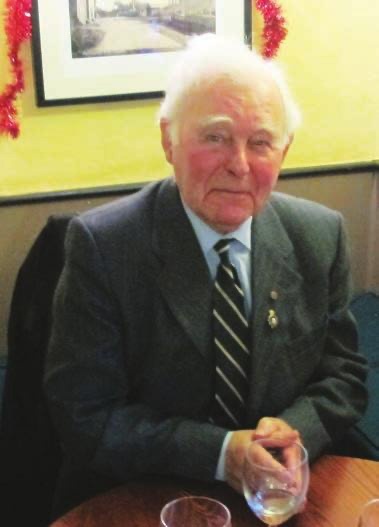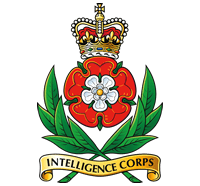Alan Edwards Award
Alan Edwards AWARD
About the Alan Edwards Award
Alan served in the Corps from 1958 until 1975. Following retirement from the Army, Alan had several posts within the Directorate of Security and upon full retirement in the mid-1990s, he redirected his attention to the Intelligence Corps. He became the Corps Historian and his knowledge of the Corps and its past activity was nothing short of phenomenal. In 2013 ill-health and age caused Alan to reduce his Corps involvement and he sadly died in August 2016.
The annual award recognises individuals or groups who have undertaken a project which fosters a better understanding of the diverse history of the Intelligence Corps.
The winner each year receives a presentation certificate, a £200 prize and a year’s complimentary membership to FICM.

This year, the award goes jointly to four trainees on the 18-week Officer Military Intelligence (OFMI) course at Chicksands, completed on 13 May 22. During their course, the 40th anniversary of the Falklands War was commemorated.
The OFMI were offered the opportunity to research the Corps role in the conflict and produce an essay to be published in the Corps journal, as well as being made available to all members of the Corps and the Corps family, acknowledging its role in the conflict, and preserving its understanding of those involved. These officers volunteered to carry out extensive research in their own time, concurrent with their OFMI workload – a sizeable commitment given the intensity of the course and their relatively short service.
Through consultation with ICA, the OFMI team identified several sources of research, including the personal accounts of retired personnel intimately linked to the Falklands War. Through research, cross-referencing, deliberation and armed with an investigatory approach, they were able to clearly, throughly and intelligently put together an essay that details the Corps role in the Falklands War. This paper will be preserved as a reflection of the Corps role in this historic victory for Britain told by those who were there. The Corps History and Heritage committee acknowledged the paper as an important capture of Corps history, something highly valued for such a young corps.
To mark the Corps’ 80th year, the soldiers and officers of 3 MI Bn were asked to visit, maintain and research the graves of Intelligence Corp personnel buried within Greater London and South East England. This was done during the Covid-19 pandemic, in reserve personnel’s own time, with no Reserve Service Day or financial incentives. The number of volunteers was humbling; each of the twenty graves could have been covered many times. Personnel went above and beyond the remit, researching not just the individuals in question but also the cemeteries they were buried in and the links to the wider communities. They consulted with the Military Intelligence Museum curator and archivist.
With the hard work completed over the summer and autumn of 2020, 3 MI published an electronic booklet in time for Remembrance Sunday. This captured photographs of the graves and cemeteries, newspaper articles about the soldiers commemorated and much more. Whilst Covid-19 prevented printed publication of the booklet, the electronic version is now held by the MIM and Int Corps HQ. The activity sets the standard for other units and shows the respect that the current Corps’ soldiers, regular and reserve, have towards those who have gone before them.
The award of £200 and inscribed memento was presented by the Friends at the postponed Corps lunch on 11 September 2021. The winner of the award is also given a year’s membership of FICM. Cpl Alex Singer, selected as ‘central to the battalion activity’ represented 3 MI to accept the award and receive the complimentary membership.
Decided by HQ Int Corps, the Alan Edwards Award for 2020 was made to Antony Baxter for his stalwart contribution to the Secret Soldiers research project over two years (2017–2019). A collaboration between the University of Northampton and the Military Intelligence Museum, the project sought to investigate thoroughly the British Army’s Intelligence Corps during WWI. Of the project’s personnel spreadsheet, which has 60,000 lines, two thirds of the data entries were recorded by Antony, resulting in a truly remarkable contribution to Intelligence Corps history. Furthermore, Antony engaged in other research activities, especially medal cards, and has written short analytical pieces. Congratulations to Antony (who is also a Friend), for winning £100 and an inscribed memento!
Antony contributed ‘The Zimmermann Telegram’ article to Sub Rosa in 2017; it is available for download at http://www.intelligencemuseum.org/library.php?LID=1&page=2
Major Francis Edward Foley CMG was a British Secret Intelligence Service Officer. As a passport control officer for the British Embassy in Berlin, Foley bent the rules and helped thousands of Jewish families escape from Nazi Germany after Kristalnacht and before the outbreak of the Second World War. He is officially recognised as a British Hero of the Holocaust.
Following the war, Foley retired to Stourbridge where he lived with his wife, Katherine. 63 MI Coy, based in Stourbridge, had been aware of Frank Foley’s ties to the Intelligence Services following initial research in 2009, and had named the company’s all ranks mess the Foley Room in his honour. In 2018, the Company began researching Foley in more detail. The book by Michael Smith Foley: The Spy Who saved 10,000 Jews (1999), alluded to Foley being an Intelligence Corps officer. Initially there was some scepticism as the London Gazette referred to him being in the Hertfordshire Regiment. However, not to be put off and through the good offices of the Corps museum, it was unequivocally confirmed in the National Archives that Foley served as an Intelligence Corps officer from 1922 to his retirement in 1949, working in what was known as MI1b.
In recognition of Foley’s efforts during the war and his service in the Intelligence Corps, 63 MI Coy designed and commissioned a tribute wall which is installed in the company HQ in the Army Reserve Centre in Stourbridge. The company contacted the FCO in Ottawa, following up on an article published on the FCO website announcing that Frank Foley’s descendants had gifted his original medal collection to the UK government in November 2017. The medals were sent back by the FCO to SIS in London. With support from ICA, the company obtained a miniature collection of the medals to be displayed alongside the tribute.
In September 2018, a bronze statue will be installed in Mary Stevens Park in Stourbridge. Afterwards, 63 MI Coy will host a reception for VIPs, town councillors and the military community with an opportunity to view the wall, and to learn more about Foley by way of a presentation by members of the company.
In late 2016 Lt Col McLean, CO 6 Military Intelligence Battalion, identified the opportunity to name Norman Road Army Reserve Centre in Manchester. Consideration was given to various Intelligence Corps personalities; however, Maj Geoffrey Harry Langdon was identified as being born in Rusholme, Manchester, approximately 600 metres from the Reserve Centre. Maj Langdon had served in both the First and Second World Wars, joining the Intelligence Corps five days before its formation in 1940: truly, one of the first Intelligence Corps officers.
Research material gathered and ad analysed by conducted by Reservist LCpl Herbert, revealed that Maj Langdon had had a very full and interesting intelligence career. A key moment in Project Langdon was the discovery of Maj Langdon’s only child, Janet, living in London. The commanding officer visited Ms Langdon in London, resulting in further contact and sight of extensive family photographs and the further personal details required to bring the biography fully to life.
It was decided that, instead of a simple plaque to commemorate Maj Langdon, that a suitable wall design would be created in the hallway at Norman Road. Reservist LCpl Edmondson, a graphic designer by primary employment, joined the team, creating the concept for the wall into a professionally delivered product consisting of bespoke printed wallpaper and a large acrylic display.
LCpl Edmondson then liaised with the company selected to complete the production and installation to ensure that the project maintained its integrity during the transition from design to production. Ms Janet Langdon officially named Norman Road Army Reserve Centre, Langdon House, on 28 June 2017, which included the unveiling of the Langdon Wall.
The project was made possible with the financial support of the Intelligence Corps Association and the North West and Isle of Man Reserve Forces Association. The Langdon Project is an excellent example of Intelligence Corps Reserve personnel bringing their civilian sector skills and combining them with Intelligence Corps skills to deliver an excellent product. The considerable hours of research and determination to provide the fullest picture of Maj Langdon’s life and present it in a suitable manner is why Lt Col McLean, LCpl Herbert and LCpl Edmondson are worthy of being awarded the Alan Edwards Award 2017.
